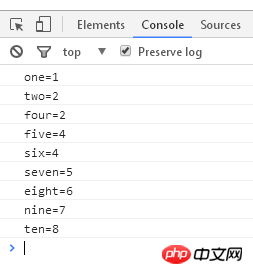
This time I will bring you a summary of the JS method of traversing irregular multi-dimensional arrays. What are the precautions for JS traversing irregular multi-dimensional arrays? The following is a practical case, let's take a look.
Go directly to the text: Sometimes when we process data, we may encounter some irregularities (unpredictable data structures), so how do we perform traversal operations when we get this kind of data? For example:var data= {
a: { one: 1, two: 2, three: {four:'2',five:'4'} },
b: { six: 4, seven: 5, eight: 6 },
c: { nine: 7, ten: 8}
}function traverse(obj) {
for (var a in obj) {
if (typeof(obj[a]) == "object") {
traverse(obj[a]); //递归遍历
} else {
console.log(a + "=" + obj[a]); //如果是值就显示
}
}
}
traverse(data)
Detailed explanation of the use of filter() method in jquery
Detailed explanation of computed use case in Vue.js
The above is the detailed content of Summary of JS traversal methods for irregular multi-dimensional arrays. For more information, please follow other related articles on the PHP Chinese website!




